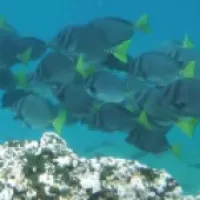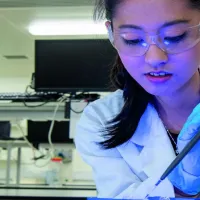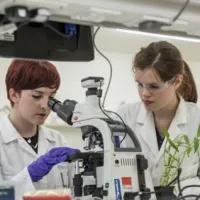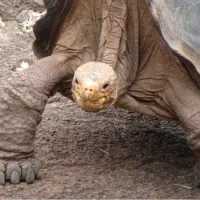About this course
Our Zoology MSci course explores the effects of climate change on animal life, the ecological impact of populations, and the survival of endangered species. With our 4-year integrated master's, you'll take specialist modules and complete an advanced research project.
You'll learn how to become a zoologist as you take extensive field trips to places like Spain, Belize and the New Forest, and gain valuable lab-based work experience.
This 4-year UK master's degree in zoology will let you explore all areas of animal life from cell biology to entire ecosystems. You'll get in-depth training in the biological processes behind animal development, growth and function. Later in the course, you can specialise in different types of zoology.
You'll carry out an extensive research project, and can collaborate with organisations in the UK or abroad.
Our tutors are leading experts in a wide range of fields in zoology, including:
- evolution
- behaviour
- conservation
- neuroscience
- development
On this course you can:
- use the £50 million facilities in our Institute for Life Sciences building
- work with our active research staff on an independent research project
- choose from a selection of modules that tailor your degree to your passions
- spend a semester studying at a university in Europe or Australasia
- take a year out to work in industry
- develop vital skills that employers look for
We have close links with nearby conservation charity and zoo, Marwell Wildlife. They can provide more opportunities for fieldwork, and even collaborate with you on your final research project.
Practicals which use animals or their tissues are an important part of the course. These practicals follow ethical policies and we'll make adjustments for you if you have valid concerns about taking part.
We regularly review our courses to ensure and improve quality. This course may be revised as a result of this. Any revision will be balanced against the requirement that the student should receive the educational service expected. Find out why, when, and how we might make changes.
Our courses are regulated in England by the Office for Students (OfS).
Accreditations
“The whole experience was absolutely insane and incredible at the same time – one of my biggest passions has always been wildlife presenting, Sir David Attenborough and Chris Packham were huge idols off mine growing up, and so the opportunity to get a taste of that world was absolutely phenomenal. It was exciting to see the public engage with zoology and the wildlife around them, something that’s so important to me, and knowing that we made that happen was an amazing feeling.”
Course location
This course is based at Highfield.
Awarding body
This qualification is awarded by the University of Southampton.
Download the Course Description Document
The Course Description Document details your course overview, your course structure and how your course is taught and assessed.
Entry requirements
For Academic year 202627
A-levels
AAB including Biology and one further science subject.
A-levels additional information
Offers typically exclude General Studies and Critical Thinking. A level science subjects considered include Chemistry, Physics, Mathematics, Psychology, Statistics, Environmental Science, Environmental Studies, Geography and Geology. Where this offer is satisfied by including grades achieved in either Biology, Chemistry or Physics, a Pass in the practical science assessment is additionally required.
A-levels with Extended Project Qualification
If you are taking an EPQ in addition to 3 A levels, you will receive the following offer in addition to the standard A level offer: AAB including Biology and one further science subject, and grade A in the EPQ
A-levels contextual offer
We are committed to ensuring that all applicants with the potential to succeed, regardless of their background, are encouraged to apply to study with us. The additional information gained through contextual data allows us to recognise an applicant's potential to succeed in the context of their background and experience. Applicants who are highlighted in this way will be made an offer which is lower than the typical offer for that programme: Grades BBB
International Baccalaureate Diploma
Pass with overall score of 34 points, with 17 points at Higher Level, including 6 points at Higher Level in Biology and one further science subject
International Baccalaureate Diploma additional information
Science subjects considered include Chemistry, Physics, Mathematics, Psychology, Statistics, Environmental Science, Environmental Studies, Geography and Geology.
International Baccalaureate contextual offer
We are committed to ensuring that all learners with the potential to succeed, regardless of their background, are encouraged to apply to study with us. The additional information gained through contextual data allows us to recognise a learner’s potential to succeed in the context of their background and experience. Applicants who are highlighted in this way will be made an offer which is lower than the typical offer for that programme.
International Baccalaureate Career Programme (IBCP) statement
Offers will be made on the individual Diploma Course subject(s) and the career-related study qualification. The CP core will not form part of the offer. Where there is a subject pre-requisite(s), applicants will be required to study the subject(s) at Higher Level in the Diploma course subject and/or take a specified unit in the career-related study qualification. Applicants may also be asked to achieve a specific grade in those elements. Please see the University of Southampton International Baccalaureate Career-Related Programme (IBCP) Statement for further information. Applicants are advised to contact their Faculty Admissions Office for more information.
BTEC
RQF BTEC
D in the BTEC Extended Certificate plus AA in A Level Biology and one further science subject
We are committed to ensuring that all learners with the potential to succeed, regardless of their background, are encouraged to apply to study with us. The additional information gained through contextual data allows us to recognise a learner’s potential to succeed in the context of their background and experience. Applicants who are highlighted in this way will be made an offer which is lower than the typical offer for that programme.
Additional information
Acceptable science subjects are Chemistry, Physics, Mathematics, Psychology, Statistics, Environmental Science, Environmental Studies, Geography and Geology. Where this offer is satisfied by including grades achieved in either Biology, Chemistry or Physics, a Pass in the practical science assessment is additionally required. Offers typically exclude General Studies and Critical Thinking
QCF BTEC
D in the BTEC Subsidiary Diploma plus AA in A Level Biology and one further science subject.
BTEC contextual
We are committed to ensuring that all learners with the potential to succeed, regardless of their background, are encouraged to apply to study with us. The additional information gained through contextual data allows us to recognise a learner’s potential to succeed in the context of their background and experience. Applicants who are highlighted in this way will be made an offer which is lower than the typical offer for that programme.
Access to HE Diploma
60 credits with a minimum of 45 credits at Level 3 of which 39 credits must be at Distinction and 6 at Merit.
Access to HE additional information
A core science Access to HE Diploma must be studied.
Access Offer Contextual
We are committed to ensuring that all learners with the potential to succeed, regardless of their background, are encouraged to apply to study with us. The additional information gained through contextual data allows us to recognise a learner’s potential to succeed in the context of their background and experience. Applicants who are highlighted in this way will be made an offer which is lower than the typical offer for that programme.
Irish Leaving Certificate
Irish Leaving Certificate (first awarded 2017)
H1, H1, H2, H2, H2, H2 to include Biology and one further science subject.
Irish certificate additional information
Acceptable science subjects considered include Chemistry, Physics, Mathematics, Psychology, Statistics, Environmental Science, Environmental Studies, Geography and Geology.. Applicants will be required to have achieved a pass in Mathematics and English at ILC Grade C or 04, the equivalent of GCSE grade C/grade 4.
Irish Offer Contextual
We are committed to ensuring that all learners with the potential to succeed, regardless of their background, are encouraged to apply to study with us. The additional information gained through contextual data allows us to recognise a learner’s potential to succeed in the context of their background and experience. Applicants who are highlighted in this way will be made an offer which is lower than the typical offer for that programme.
Scottish Qualification
Offers will be based on exams being taken at the end of S6. Subjects taken and qualifications achieved in S5 will be reviewed. Careful consideration will be given to an individual’s academic achievement, taking in to account the context and circumstances of their pre-university education.
Please see the University of Southampton’s Curriculum for Excellence Scotland Statement (PDF) for further information. Applicants are advised to contact their Faculty Admissions Office for more information.
Cambridge Pre-U
D3, D3, M2 to include Biology and one further science subject.
Cambridge Pre-U additional information
Science subjects considered include Chemistry, Physics, Mathematics, Psychology, Statistics, Environmental Science, Environmental Studies, Geography and Geology. Cambridge Pre-U's can be used in combination with other qualifications such as A Levels to achieve the equivalent of the typical offer, where D3 can be used in lieu of A Level grade A or grade M2 can be used in lieu of grade B.
Cambridge Pre-U Offer Contextual
We are committed to ensuring that all learners with the potential to succeed, regardless of their background, are encouraged to apply to study with us. The additional information gained through contextual data allows us to recognise a learner’s potential to succeed in the context of their background and experience. Applicants who are highlighted in this way will be made an offer which is lower than the typical offer for that programme.
Welsh Baccalaureate
AAB from 3 A levels including Biology and one further science subject or AA from two A levels including Biology and one further a science subject and B from the Advanced Skills Baccalaureate Wales
Welsh Baccalaureate additional information
A level science subjects considered include Chemistry, Physics, Mathematics, Psychology, Statistics, Environmental Science, Environmental Studies, Geography and Geology. Where this offer is satisfied by including grades achieved in either Biology, Chemistry or Physics, a Pass in the practical science assessment is additionally required. General Studies, Critical Thinking are excluded for entry.
Welsh Baccalaureate contextual offer
We are committed to ensuring that all learners with the potential to succeed, regardless of their background, are encouraged to apply to study with us. The additional information gained through contextual data allows us to recognise a learner’s potential to succeed in the context of their background and experience. Applicants who are highlighted in this way will be made an offer which is lower than the typical offer for that programme.
T-Level
Not accepted for this course.
Other requirements
GCSE requirements
Applicants must hold GCSE English Language (or GCSE English), Mathematics and Science at minimum grade C/4.
Find the equivalent international qualifications for our entry requirements.
English language requirements
If English is not your first language, you must show that you can use English to the level we require. Visit our English language pages to find out which qualifications we accept and how you can meet our requirements.
If you are taking the International English Language Testing System (IELTS), you must get at least the following scores:
IELTS score requirements
- overall score
- 6.5
- reading
- 6.0
- writing
- 6.0
- speaking
- 6.0
- listening
- 6.0
If you do not meet the English language requirements through a test or qualification, you may be able to meet them by completing one of our pre-sessional English programmes before your course starts.
You might meet our criteria in other ways if you do not have the qualifications we need. Find out more about:
- skills you might have gained through work or other life experiences (otherwise known as recognition of prior learning)
Find out more about our Admissions Policy.
Science Foundation Year
The Science Foundation Year will give you the skills and knowledge to progress to this course if you don't have the right qualifications for direct entry.
It could be the right option if you:
- are studying for A levels in subjects other than those we normally ask for
- are a mature applicant with skills and experience from employment and can show recent study
- you come from a part of the world where the education system is different from the British A level system
Find full details on our Science Foundation Year page.
Foundation programmes for international students
A foundation programme will give you the language skills and subject knowledge you need if you're not qualified for direct entry to your chosen undergraduate course.
You'll progress to your chosen course after successfully completing the foundation programme.
Find out more about undergraduate foundation programmes for international students.
Mature applicants
We welcome applications from learners of all ages. Students who are aged 21 and over at the start of their undergraduate course are defined as mature by the University of Southampton. We take a holistic assessment of the application looking for academic ability and commitment to study. Typical entry requirements, which may vary from discipline to discipline, includes for example, evidence of recent formal academic qualifications or professional qualifications, relevant work experience or volunteering. You may also be invited to attend an interview with an Admissions Tutor. For some degree programmes, there may also be a Professional, Statutory and Regulatory Body (PSRB) requirement. We accept many different academic qualifications. For more information, please contact the Admissions Team.
Got a question?
Please contact our enquiries team if you're not sure that you have the right experience or qualifications to get onto this course.
Email: enquiries@southampton.ac.uk
Tel: +44(0)23 8059 5000
Course structure
On MSci Zoology, you'll study both compulsory and optional modules, including skills-focused modules to help you develop your laboratory, field, computational and statistical skills. As the master's course progresses, you can focus more on your particular areas of interest.
You do not need to select your modules when you apply. Your academic tutor will help you customise your course.
You'll complete independent research projects in years 3 and 4.
Year 1 overview
Compulsory modules will give you a solid understanding of the key principles of zoology, covering:
- cell biology
- ecology and evolution
- genetics
- molecular biology
- organisms and their environment
- physiology
You'll look at the patterns of life, understand global challenges such as climate change and food security, and learn vital biomolecular techniques.
There is also a UK residential field trip, that will develop your fieldwork skills.
Year 2 overview
You'll take a number of compulsory modules, exploring areas such as:
- animal behaviour
- vertebrate development
- evolution
- quantitative methods
Optional modules will further develop your personal interests. These include topics like:
- pollution
- neuroscience
- genetics
- behaviour
- palaeobiology
- geographic information systems
You can enhance your fieldwork experience with field courses in the New Forest or Spain.
Year 3 overview
You'll complete an independent research project that is either laboratory, field or computer based.
You'll also choose from a wide range of optional modules to build on what you've learned so far. These include:
- cell biology
- ecology and evolution
- toxicity
- behavioural ecology
- global challenges
You can also choose to take a 14-day field trip to Belize to study tropical ecology.
Year 4 overview
In your last year, you'll complete an extended laboratory or a field-based research project, on a topic that interests you. This will add to your research knowledge and skills.
You'll also choose from a wide range of specialised optional modules. These include:
- immunology
- computational methods
- applied ecology
- plant cell biology
- parasitology
- molecular bioscience
Want more detail? See all the modules in the course.
Modules
The modules outlined provide examples of what you can expect to learn on this degree course based on recent academic teaching. As a research-led University, we undertake a continuous review of our course to ensure quality enhancement and to manage our resources. The precise modules available to you in future years may vary depending on staff availability and research interests, new topics of study, timetabling and student demand. Find out why, when and how we might make changes.
For entry in academic year 2026 to 2027
Year 1 modules
You must study the following modules in year 1:
Fundamentals of Cell Biology and Physiology
This module develops understanding of the components important for cell function and looks at how cells function in organs and whole organisms. Lectures will be accompanied by practicals, some of which involve the use of animal tissue, with alternative...
How to Think Like a Scientist
The module teaches how to formulate hypotheses and structure an experimental proposal, ultimately leading to data dissemination in form of a presentation / report / scientific paper. The module connects to real problems, where success in own experiment...
Organisms and their Environment
This module will explore how climate change and other anthropogenic activities are affecting life on earth. It will detail scientific research spanning disciplines and allow students to form arguments and interrogate the primary literature for evidence to...
Origins of Biodiversity
In this module you will explore and explain patterns of global biodiversity over space and time, affecting a wide variety of lineages. We will begin as 18th century natural historians, considering the impact of new discoveries, due to the invention of the...
Year 2 modules
You must study the following modules in year 2:
Animal Behaviour
This module provides an introduction to the study of animal behaviour taking an integrative approach that addresses animal behaviour from ethological, ecological and evolutionary angles and to review the basic concepts of behaviour as a science.
Behaviour and Ecology Field Course
A week-long field course held in Bolonia on the Andalucian coast of Southern Spain, within the Estrecho natural park. The field course will take place during the Easter holidays, when there is a large diversity of flora and fauna to survey. As a residenti...
Evolution
The module seeks to: - explore the main evolutionary processes - consider evolution at the phenotypic as well as the molecular level - consider evolutionary processes occurring at different time scales
Quantitative Methods in Biological and Environmental Science
This module develops analytical skills required for the final year Honours Project, scientific research in general, and your future career. The major skills are computer literacy and graphical presentation, understanding of scientific method and hypothes...
Vertebrate Development
This module provides the second year student with the basic concepts of human and other vertebrate animal development. Students will come to understand the main mechanisms behind both animal development and organised cellular differentiation and how these...
Vertebrate Zoology
Vertebrates are amongst the most successful animal groups. From fish, amphibians, lizards, crocodiles, birds and mammals, you will gain an understanding how the basal members of the clade have diversified and evolved to fill every imaginable niche on land...
You must also choose from the following modules in year 2:
Adaptive Physiology
This module provides insight in various aspects of adaptive animal physiology including the regulation of circulation, respiration, body temperature, feeding and metabolism, the skeletal system and developmental transitions. The way that these systems hav...
Applied and Environmental Biochemistry
This module will outline fundamental biochemistry of plants, microbes and environmental processes.
Bioinformatics
The module includes an introduction to bioinformatics and its role in modern 'Omics' technologies; developments in DNA sequencing technologies; bioinformatic analyses of DNA; sequence alignment and biological databases.
Conservation management field course
This module will provide you with valuable ecological surveying and species identification techniques within the context of conservation priorities for a local and unique national park, the New Forest, through a series of day trips in order to complete a ...
Environmental Microbiology
See aims and learning outcomes
Exploring Proteins: Structure and Function
The module will revise and extend the study of protein architecture, interactions and enzyme function. During the module we explain common concepts using specific systems. The case studies include studies of membrane ion channels, enzymes such as protease...
Flow of Genetic Information
This module focuses on nucleic acid and protein biogenesis with particular emphasis on the flow of genetic information from DNA to RNA to proteins and key regulatory steps. Material relating to both prokaryotic and eukaryotic organisms will be covered.
Freshwater Ecosystems
Freshwater Ecosystems initially considers the interplay between the physics, chemistry and biology of freshwater ecosystems. A comparative approach is adopted, in which upland streams, lowland rivers, lakes and other standing freshwater environments are c...
Geographical Information Systems (GIS)
The module will introduce the concepts and techniques underpinning geographic information systems.
Global Sustainability Challenges
The global challenge that is 'sustainability' impacts every dimension of all of our lives. Regardless of your degree, the social, cultural, economic and environmental dimensions of sustainability have important implications for your studies, your daily ...
Immunology, Infection and Inflammation
The course will give students an introduction to basic immune mechanisms and emphasizes the basic principles of immunology, including the cells and molecules that make up the innate and adaptive immune system. This first part will show how the immune syst...
Palaeobiology
This module will deliver a comprehensive analysis of the cutting-edge topics associated with the fields of Palaeobiology and Palaeontology. We will cover topics focusing on the role of the fossil record in understanding past, present, and future ecosyste...
Plant Development and Function
This module provides an understanding of plant function and development at a molecular, cellular and whole organism level.
Population and Community Ecology
This module builds on the basic principles of ecology introduced in year 1, to achieve a broad appreciation of current theory and practice in population and community ecology. Lectures and practicals will explore the processes involved in the dynamic func...
Year 3 modules
You must choose your modules from the following modules in year 3:
Adapting to Climate Change and Weather Hazards
GGES3019 is a multidisciplinary unit designed for students with an interest in how individuals and societies understand and respond to environmental shocks and stresses, and their different capacities for adaptation. The focus of the module is on climate ...
Advanced Geographical Information Systems
The module will look at the conceptual, practical and methodological issues associated with geospatial analysis for environmental and socio-economic applications.
Applied Plant Biology
This module provides a broad introduction to the applied use of plants in the modern world. The module will cover the production of transgenic (GM) plants and their applications in a variety of areas including medical biotechnology, nutrition, phytoremedi...
Behavioural Ecology
Behavioural ecology considers the evolutionary pressures that shape behaviour. This module will explore animal behaviours from evolutionary biology and population ecological perspectives. Each week, lectures will consider a different behavioural ecology t...
Biodiversity and Conservation
This module concerns global biodiversity, what we understand by it and why it is in crisis, and current efforts to conserve and manage it. We begin with an appraisal of different values of diversity at scales from genetic to species, communities and ecosy...
Biofilms and Microbial Communities
This module aims to provide an understanding of bacterial biofilms and the environmental, industrial and health care problems related to complex microbial consortia of societal importance. Students will learn to describe and explain the basis for biofilm ...
Bioinformatics and Systems Biology
Large-scale approaches at the molecular, cellular, organismal and ecological level are revolutionizing biology by enabling systems-level questions to be addressed. In many cases, these approaches are driven by technologies that allow the components of bio...
Biomedical Parasitology
This module will introduce the main issues in parasitology, the host parasite interaction and how it drives evolutionary changes, the disease burden caused by parasites and how parasite infections can be treated/minimised. Lectures will be accompanied ...
Biomedical Technology
This course is designed to illustrate the ways in which the theoretical principles of biochemistry, cellular and molecular biology presented in previous courses can be applied to yield important commercial or therapeutic products or processes.
Cancer Chromosome Biology
This module will deliver a comprehensive analysis of selected topics associated with the cellular and molecular mechanisms that drive cancer development and lead to tumour progression. This will involve exploring the genetic drivers of disease, the mechan...
Cellular and Molecular Neuroscience
The aim of this module is to provide an understanding of the molecular and cellular basis of brain function. We will use examples of specific molecules and cell-cell interactions to provide explicit details of such function to highlight core principles of...
Environmental Law and Management
This module will enable students to apply their understanding of environmental problems and assess potential solutions through the application of law, policy, and management. The lecture sessions will introduce and analyse the theoretical development and ...
Evolution and Development
This module will deliver a comprehensive analysis of the topics associated with evolutionary developmental biology. This will involve exploring the theory of evolution; embryology and molecular pathways of development; what the fossil record tells us abou...
Evolution and Genetics
Evolutionary processes impact on individuals, populations, and communities. Evolution typically happens over long time periods, but this is not always the case. Strong selection can result in rapid evolution. This is underpinned by understanding the genet...
External Research Project
Each student undertakes an independent research investigation using, for example, a collection at a museum, or similar. The research includes both literature survey and practical components. The literature component will consist of a critical review of w...
Field Research Project
Each student undertakes an investigation which includes both practical and theoretical components. The theory component will consist of a critical review of the literature relating to the proposed experimental component of the project. The fieldwork is re...
Fluxes, Cycles and Microbial Communities
Microorganisms are key players in all the major biogeochemical cycles on Earth. Fluxes, Cycles, and Microbial Communities explores the microbial influence on the biological, chemical, and geological processes that shape natural environments on our planet....
Global Challenges in Biology
This module will consider human-caused global challenges and their impact on marine and terrestrial ecosystems. We will discuss the main causes of global change, including greenhouse gases, changes in temperature and rainfall, and human land use, as well ...
Immunology
This module covers the major topics in cellular and molecular immunology, including antigen recognition, antigen processing and presentation to B and T cells, the molecular events leading to the generation of antibody and T cell receptor diversity, antibo...
In-Silico Research Project
Each student undertakes an investigation which includes both practical and theoretical components. The theory component will consist of a critical review of the literature relating to the proposed experimental/analytical component of the project. The topi...
Laboratory Research Project
Each student undertakes an investigation which includes both practical and theoretical components. The theory component will consist of a critical review of the literature relating to the proposed experimental component of the project. The laboratory work...
Microbiomes and Health
Humans are holobionts: we harbour and live in close association with unique microbial populations of bacteria, archaea, viruses, and fungi. These microbial communities that inhabit our mouth, skin or gut are vital for maintaining a robust immune system, a...
Molecular Cell Biology
The organisation of the eukaryotic cell has always fascinated researchers. This module illustrates the upkeep of cellular structure and function.
Molecular and Structural Basis of Disease
The course provides an insight into how molecular studies can be employed to further medical research and aid in the development of novel treatments and therapeutics. The course will cover a number of areas including the analysis of genetic diseases, amyl...
Neurodegenerative Disease
The neurobiology that underpins the aetiology and pathogenesis of neurodegenerative disease has been a focus of intense and exciting research activity over the last several decades. The module is largely a research-led module whereby the contributing staf...
Tropical Ecology Field Course
This module will provide first-hand experience of ecology and conservation in a tropical environment and give you a foundation in a range of topics including biodiversity, community ecology, ecosystem processes, anthropogenic impacts, in-situ and ex-situ ...
Year 4 modules
You must study the following module in year 4:
You must also choose from the following modules in year 4:
Advanced Field Research Project
The aim of this module is to allow students to carry out an extensive field-based research project on a specific topic related to his/her main area of study.
Advanced Research Project
The aim of this module is to allow students to carry out an extensive research project on a specific topic related to their main area of study.
Applied Plant Biology
The module provides a broad outline of the applications of plant biotechnology in the modern world. Where possible, general principles are developed alongside specific examples rather than giving exhaustive lists of detailed information. Plants are incr...
Biodiversity and Conservation
This module concerns global biodiversity, what we understand by it and why it is in crisis, and current efforts to conserve and manage it. We begin with an appraisal of different values of diversity at scales from genetic to species, communities and ecosy...
Biofilms and Microbial Communities
BIOL6047 ‘Biofilms and Microbial Communities’ aims to provide an understanding of bacterial biofilms and the environmental, industrial and health care problems related to complex microbial consortia of societal importance. Students will learn to describe ...
Bioinformatics and Systems Biology
Large-scale approaches at the molecular, cellular, organismal and ecological level are revolutionizing biology by enabling systems-level questions to be addressed. In many cases, these approaches are driven by technologies that allow the components of bio...
Biological Data Science in R
Biological data science is a rapidly evolving field at the intersection of biology, statistics, and computer science. There is a growing demand for professionals skilled in analysing and interpreting data as well as an expectation that students will be fa...
Biomedical Technology
This course is designed to illustrate the ways in which the theoretical principles of biochemistry, cellular and molecular biology presented in previous courses can be applied to yield important commercial or therapeutic products or processes.
Cancer Chromosome Biology
This module will deliver a comprehensive analysis of selected topics associated with the cellular and molecular mechanisms that drive cancer development and lead to tumour progression. This will involve exploring the genetic drivers of disease, the mechan...
Current Topics in Cell and Developmental Biology
This module provides a detailed and up-to-date study of a small number of topics in modern cell biology
Evolution and Development
This module will deliver a comprehensive analysis of the topics associated with evolutionary developmental biology. This will involve exploring the theory of evolution; embryology and molecular pathways of development; what the fossil record tells us abou...
Evolution and Genetics
Evolutionary processes impact on individuals, populations, and communities. Evolution typically happens over long time periods, but this is not always the case. Strong selection can result in rapid evolution. This is underpinned by understanding the genet...
Global Challenges in Biology
This module will consider human-caused global challenges and their impact on marine and terrestrial ecosystems. We will discuss the main causes of global change, including greenhouse gases, changes in temperature and rainfall, and human land use, as well ...
Microbiomes and Health
Humans are holobionts: we harbour and live in close association with unique microbial populations of bacteria, archaea, viruses, and fungi. These microbial communities that inhabit our mouth, skin or gut are vital for maintaining a robust immune system, a...
Pharmacology of Neuropsychiatric Disorders
This module is to describe basic concepts in neuropharmacology e.g. on the localisation and putative function of neurotransmitter pathways in the brain, and to use this knowledge to consider different theories relating to the biochemical basis of action o...
Skills in Biological Optical Imaging
Students will gain an understanding of the components and optical pathways used in core biological imaging systems which will enable them to efficiently operate advanced microscopes and to understand the theoretical concepts, capabilities and limitations ...
Skills in Molecular Bioscience
Skills in the molecular biosciences are rapidly developing. This course will prepare students for several common techniques, giving them a grounding in experimental design so that they can use these new skills in their current and future research career.
Skills in Structural Biology
Student will acquire a foundation in the theory underpinning a range of biophysical techniques used to study structure and function of biomolecules. The students will have the opportunity to learn at a practical level how these techniques are employed, le...
Learning and assessment
The learning activities for this course include the following:
- lectures
- classes and tutorials
- coursework
- individual and group projects
- independent learning (studying on your own)
Course time
How you'll spend your course time:
Year 1
Study time
Your scheduled learning, teaching and independent study for year 1:
How we'll assess you
- coursework, laboratory reports and essays
- individual and group projects
- oral presentations
- portfolios
- written and practical exams
Your assessment breakdown
Year 1:
Year 2
Study time
Your scheduled learning, teaching and independent study for year 2:
How we'll assess you
- coursework, laboratory reports and essays
- individual and group projects
- oral presentations
- portfolios
- written and practical exams
Your assessment breakdown
Year 2:
Year 3
Study time
Your scheduled learning, teaching and independent study for year 3:
How we'll assess you
- coursework, laboratory reports and essays
- individual and group projects
- oral presentations
- portfolios
- written and practical exams
Your assessment breakdown
Year 3:
Year 4
Study time
Your scheduled learning, teaching and independent study for year 4:
How we'll assess you
- coursework, laboratory reports and essays
- individual and group projects
- oral presentations
- portfolios
- written and practical exams
Your assessment breakdown
Year 4:
Academic support
You’ll be supported by a personal academic tutor and have access to a senior tutor.
Course leader
Mark Chapman is the course leader.
Careers and employability
Employability skills
This degree will allow you to develop and evidence subject-specific and targeted employability skills. This includes the required skill set for a range of future careers, further study, or starting your own business.
The skills you can expect to focus on and gain from this course include:
- Research
- Critical thinking
- Self-management
- Confidence
- Communication
- Teamwork
- Creativity
- Problem solving
The employability and enterprise skills you'll gain from this course are reflected in the Southampton skills model. When you join us you'll be able to use our skills model to track, plan, and benefit your career development and progress.
Download skills overview
Career pathways
Graduates commonly work in a range of organisations or sectors including:
Zoos and wildlife parks,
Environmental protection agencies,
Animal and environmental charities,
Aquaculture and animal nutrition companies,
Conservation organisations,
Chemical, pharmaceutical and petroleum companies.
- Animal nutritionist
- Ecologist
- Environmental consultant
- Marine scientist
- Nature Conservation officer
- Zookeeper
- Zoologist
- Wildlife biologist
- Research scientist
- Animal behaviourist
- Animal physiotherapist
- Field trails officer
- Marine biologist
- Palaeontologist
- Toxicologist
- Veterinary nurse
- Secondary school teacher
- HE lecturer
- Scientific officer
- Assistant ecologist
- Zoologist
- Science technician
- Senior analyst
- Gamekeeper
- Divemaster
- Veterinary care assistant
Job prospects for MSci Zoology graduates
*Example graduate job titles and job prospect statistics taken from The Graduate Outcomes Survey, which gathers information about the activities and perspectives of graduates 15 months after finishing their course.

Year in employment
You can apply for a year in employment placement on this course. This is a great way to improve your employability and confidence in your career prospects. Recommended by 100% of students who've taken part, you can apply for a UK or global placement in any sector.
Careers services and support
We are a top 20 UK university for employability (QS Graduate Employability Rankings 2022). Our Careers, Employability and Student Enterprise team will support you. This support includes:
- work experience schemes
- CV and interview skills and workshops
- networking events
- careers fairs attended by top employers
- a wealth of volunteering opportunities
- study abroad and summer school opportunities
We have a vibrant entrepreneurship culture and our dedicated start-up supporter, Futureworlds, is open to every student.
Your career ideas and graduate job opportunities may change while you're at university. So it is important to take time to regularly reflect on your goals, speak to people in industry and seek advice and up-to-date information from Careers, Employability and Student Enterprise professionals at the University.
Fees, costs and funding
Tuition fees
Fees for a year's study:
- UK students pay £9,535.
- EU and international students pay £30,300.
What your fees pay for
Your tuition fees pay for the full cost of tuition and all examinations.
Find out how to:
Accommodation and living costs, such as travel and food, are not included in your tuition fees. There may also be extra costs for retake and professional exams.
Explore:
Bursaries, scholarships and other funding
If you're a UK or EU student and your household income is under £36,200 a year, you may be able to get a University of Southampton bursary to help with your living costs. Find out about bursaries and other funding we offer at Southampton.
If you're a care leaver or estranged from your parents, you may be able to get a specific bursary.
Get in touch for advice about student money matters.
Scholarships and grants
You may be able to get a scholarship or grant to help fund your studies.
We award scholarships and grants for travel, academic excellence, or to students from under-represented backgrounds.
Support during your course
The Student Hub offers support and advice on money to students. You may be able to access our Student Support fund and other sources of financial support during your course.
Funding for EU and international students
Find out about funding you could get as an international student.
How to apply
What happens after you apply?
We will assess your application on the strength of your:
- predicted grades
- academic achievements
- personal statement
- academic reference
We'll aim to process your application within 2 to 6 weeks, but this will depend on when it is submitted. Applications submitted in January, particularly near to the UCAS equal consideration deadline, might take substantially longer to be processed due to the high volume received at that time.
Equality and diversity
We treat and select everyone in line with our Equality and Diversity Statement.
Got a question?
Please contact our enquiries team if you're not sure that you have the right experience or qualifications to get onto this course.
Email: enquiries@southampton.ac.uk
Tel: +44(0)23 8059 5000
Related courses
Zoology (MSci) is a course in the Biological sciences subject area. Here are some other courses within this subject area:

Biochemistry

Biochemistry
Biology
Biology

Biology and Marine Biology

Biology and Marine Biology

Biomedical Sciences

Biomedical Sciences
Chemistry with Medicinal Chemistry

Chemistry with Medicinal Chemistry
Microbiology
-
Study
- View all courses
- Taught postgraduate study
- Pre-sessional English courses
-
Subjects
- Acoustical engineering
- Aeronautical and astronautical engineering
- Ageing and gerontology
- Archaeology
- Art, design and fashion
- Audiology
- Biological sciences
- Biomedical and medical engineering
- Business, accounting, finance and marketing
- Chemistry
- Civil engineering
- Computer science and software engineering
- Economics
- Education
- Electrical and electronic engineering
- English
- Film studies
- French
- Geography and environmental science
- History
- Languages and linguistics
- Law
- Maritime engineering
- Mathematical sciences
- Mechanical engineering
- Medicine
- Music
- Nursing, midwifery and healthcare
- Ocean and Earth science
- Philosophy
- Photonics and optoelectronics
- Physics and astronomy
- Politics and international relations
- Psychology
- Social statistics and demography
- Sociology, social policy and criminology
-
PhDs and research degrees
- Create your own research project
-
Find a PhD project
- A missing link between continental shelves and the deep sea: Have we underestimated the importance of land-detached canyons?
- A study of rolling contact fatigue in electric vehicles (EVs)
- Acoustic monitoring of forest exploitation to establish community perspectives of sustainable hunting
- Acoustic sensing and characterisation of soil organic matter
- Advancing intersectional geographies of diaspora-led development in times of multiple crises
- Aero engine fan wake turbulence – Simulation and wind tunnel experiments
- Against Climate Change (DACC): improving the estimates of forest fire smoke emissions
- All-in-one Mars in-situ resource utilisation (ISRU) system and life-supporting using non-thermal plasma
- An electromagnetic study of the continent-ocean transition southwest of the UK
- An investigation of the relationship between health, home and law in the context of poor and precarious housing, and complex and advanced illness
- Antibiotic resistance genes in chalk streams
- Being autistic in care: Understanding differences in care experiences including breakdowns in placements for autistic and non-autistic children
- Biogeochemical cycling in the critical coastal zone: Developing novel methods to make reliable measurements of geochemical fluxes in permeable sediments
- Bloom and bust: seasonal cycles of phytoplankton and carbon flux
- British Black Lives Matter: The emergence of a modern civil rights movement
- Building physics for low carbon comfort using artificial intelligence
- Business studies and management: accounting
- Business studies and management: banking and finance
- Business studies and management: decision analytics and risk
- Business studies and management: digital and data driven marketing
- Business studies and management: human resources (HR) management and organisational behaviour
- Business studies and management: strategy, innovation and entrepreneurship
- Carbon storage in reactive rock systems: determining the coupling of geo-chemo-mechanical processes in reactive transport
- Cascading hazards from the largest volcanic eruption in over a century: What happened when Hunga Tonga-Hunga Ha’apai erupted in January 2022?
- Characterisation of cast austenitic stainless steels using ultrasonic backscatter and artificial intelligence
- Climate Change effects on the developmental physiology of the small-spotted catshark
- Climate at the time of the Human settlement of the Eastern Pacific
- Collaborative privacy in data marketplaces
- Compatibility of climate and biodiversity targets under future land use change
- Cost of living in modern and fossil animals
- Creative clusters in rural, coastal and post-industrial towns
- Deep oceanic convection: the outsized role of small-scale processes
- Defect categories and their realisation in supersymmetric gauge theory
- Defining the Marine Fisheries-Energy-Environment Nexus: Learning from shocks to enhance natural resource resilience
- Design and fabrication of next generation optical fibres
- Developing a practical application of unmanned aerial vehicle technologies for conservation research and monitoring of endangered wildlife
- Development and evolution of animal biomineral skeletons
- Development of all-in-one in-situ resource utilisation system for crewed Mars exploration missions
- Ecological role of offshore artificial structures
- Effect of embankment and subgrade weathering on railway track performance
- Efficient ‘whole-life’ anchoring systems for offshore floating renewables
- Electrochemical sensing of the sea surface microlayer
- Engagement with nature among children from minority ethnic backgrounds
- Enhancing UAV manoeuvres and control using distributed sensor arrays
- Ensuring the Safety and Security of Autonomous Cyber-Physical Systems
- Environmental and genetic determinants of Brassica crop damage by the agricultural pest Diamondback moth
- Estimating marine mammal abundance and distribution from passive acoustic and biotelemetry data
- Evolution of symbiosis in a warmer world
- Examining evolutionary loss of calcification in coccolithophores
- Explainable AI (XAI) for health
- Explaining process, pattern and dynamics of marine predator hotspots in the Southern Ocean
- Exploring dynamics of natural capital in coastal barrier systems
- Exploring the mechanisms of microplastics incorporation and their influence on the functioning of coral holobionts
- Exploring the potential electrical activity of gut for healthcare and wellbeing
- Exploring the trans-local nature of cultural scene
- Facilitating forest restoration sustainability of tropical swidden agriculture
- Faulting, fluids and geohazards within subduction zone forearcs
- Faulting, magmatism and fluid flow during volcanic rifting in East Africa
- Fingerprinting environmental releases from nuclear facilities
- Flexible hybrid thermoelectric materials for wearable energy harvesting
- Floating hydrokinetic power converter
- Glacial sedimentology associated subglacial hydrology
- Green and sustainable Internet of Things
- How do antimicrobial peptides alter T cell cytokine production?
- How do calcifying marine organisms grow? Determining the role of non-classical precipitation processes in biogenic marine calcite formation
- How do neutrophils alter T cell metabolism?
- How well can we predict future changes in biodiversity using machine learning?
- Hydrant dynamics for acoustic leak detection in water pipes
- If ‘Black Lives Matter’, do ‘Asian Lives Matter’ too? Impact trajectories of organisation activism on wellbeing of ethnic minority communities
- Illuminating luciferin bioluminescence in dinoflagellates
- Imaging quantum materials with an XFEL
- Impact of neuromodulating drugs on gut microbiome homeostasis
- Impact of pharmaceuticals in the marine environment in a changing world
- Improving subsea navigation using environment observations for long term autonomy
- Information theoretic methods for sensor management
- Installation effect on the noise of small high speed fans
- Integrated earth observation mapping change land sea
- Interconnections of past greenhouse climates
- Investigating IgG cell depletion mechanisms
- Is ocean mixing upside down? How mixing processes drive upwelling in a deep-ocean basin
- Landing gear aerodynamics and aeroacoustics
- Lightweight gas storage: real-world strategies for the hydrogen economy
- Machine learning for multi-robot perception
- Machine learning for multi-robot perception
- Marine ecosystem responses to past climate change and its oceanographic impacts
- Mechanical effects in the surf zone - in situ electrochemical sensing
- Microfluidic cell isolation systems for sepsis
- Migrant entrepreneurship, gender and generation: context and family dynamics in small town Britain
- Miniaturisation in fishes: evolutionary and ecological perspectives
- Modelling high-power fibre laser and amplifier stability
- Modelling soil dewatering and recharge for cost-effective and climate resilient infrastructure
- Modelling the evolution of adaptive responses to climate change across spatial landscapes
- Nanomaterials sensors for biomedicine and/or the environment
- New high-resolution observations of ocean surface current and winds from innovative airborne and satellite measurements
- New perspectives on ocean photosynthesis
- Novel methods of detecting carbon cycling pathways in lakes and their impact on ecosystem change
- Novel technologies for cyber-physical security
- Novel transparent conducting films with unusual optoelectronic properties
- Novel wavelength fibre lasers for industrial applications
- Ocean circulation and the Southern Ocean carbon sink
- Ocean influence on recent climate extremes
- Ocean methane sensing using novel surface plasmon resonance technology
- Ocean physics and ecology: can robots disentangle the mix?
- Ocean-based Carbon Dioxide Removal: Assessing the utility of coastal enhanced weathering
- Offshore renewable energy (ORE) foundations on rock seabeds: advancing design through analogue testing and modelling
- Optical fibre sensing for acoustic leak detection in buried pipelines
- Optimal energy transfer in nonlinear systems
- Optimal energy transfer in nonlinear systems
- Optimizing machine learning for embedded systems
- Oxidation of fossil organic matter as a source of atmospheric CO2
- Partnership dissolution and re-formation in later life among individuals from minority ethnic communities in the UK
- Personalized multimodal human-robot interactions
- Preventing disease by enhancing the cleaning power of domestic water taps using sound
- Quantifying riparian vegetation dynamics and flow interactions for Nature Based Solutions using novel environmental sensing techniques
- Quantifying the response and sensitivity of tropical forest carbon sinks to various drivers
- Quantifying variability in phytoplankton electron requirements for carbon fixation
- Resilient and sustainable steel-framed building structures
- Resolving Antarctic meltwater events in Southern Ocean marine sediments and exploring their significance using climate models
- Robust acoustic leak detection in water pipes using contact sound guides
- Silicon synapses for artificial intelligence hardware
- Smart photon delivery via reconfigurable optical fibres
- The Gulf Stream control of the North Atlantic carbon sink
- The Mayflower Studentship: a prestigious fully funded PhD studentship in bioscience
- The calming effect of group living in social fishes
- The duration of ridge flank hydrothermal exchange and its role in global biogeochemical cycles
- The evolution of symmetry in echinoderms
- The impact of early life stress on neuronal enhancer function
- The oceanic fingerprints on changing monsoons over South and Southeast Asia
- The role of iron in nitrogen fixation and photosynthesis in changing polar oceans
- The role of singlet oxygen signaling in plant responses to heat and drought stress
- Time variability on turbulent mixing of heat around melting ice in the West Antarctic
- Triggers and Feedbacks of Climate Tipping Points
- Uncovering the drivers of non-alcoholic fatty liver disease progression using patient derived organoids
- Understanding recent land-use change in Snowdonia to plan a sustainable future for uplands: integrating palaeoecology and conservation practice
- Understanding the role of cell motility in resource acquisition by marine phytoplankton
- Understanding the structure and engagement of personal networks that support older people with complex care needs in marginalised communities and their ability to adapt to increasingly ‘digitalised’ health and social care
- Unpicking the Anthropocene in the Hawaiian Archipelago
- Unraveling oceanic multi-element cycles using single cell ionomics
- Unravelling southwest Indian Ocean biological productivity and physics: a machine learning approach
- Using acoustics to monitor how small cracks develop into bursts in pipelines
- Using machine learning to improve predictions of ocean carbon storage by marine life
- Vulnerability of low-lying coastal transportation networks to natural hazards
- X-ray imaging and property characterisation of porous materials
- Funding your research degree
- How to apply for a PhD or research degree
- How to make a PhD enquiry
- Support while studying your PhD or research degree
- Exchanges and studying abroad
- Undergraduate study
-
Tuition fees, funding and scholarships
- Fee status
- Scholarships
- Undergraduate funding options
-
Postgraduate funding options
-
Postgraduate scholarships
- Black Futures Postgraduate Research Scholarships (Environmental and Life Sciences)
- Black Futures scholarship
- China Excellence Scholarship
- GREAT Scholarships 2025 – Egypt
- GREAT Scholarships 2025 – France
- GREAT Scholarships 2025 – Ghana
- Horizon Europe fee waiver
- India Excellence Scholarship
- Nigeria Excellence Scholarship
- Nursing Global Impact Scholarship
- Postgraduate Taught Diversity Scholarship (Environmental and Life Sciences)
- Social Impact Scholarships
- Southampton Business School (MSc) Dean Scholarship (UK)
- Southampton Faculty of Medicine PGT Talent Scholarship
- Southampton History Patricia Mather and Helen Patterson Scholarship
- Southampton MA Holocaust scholarships
- Southampton Philosophy David Humphris-Norman Scholarship
- Southampton Philosophy MA Scholarship
- Southampton Photonics Impact Scholarship
- Southampton UK Alumni Music Scholarship
- Study in Art and Media Technology Scholarship
- Thailand Excellence Scholarship
- The National Institute for Health and care Research South Central INSIGHT Programme
- The South Coast Doctoral Training Partnership Social Science PhD Studentships
- Vietnam Excellence Scholarship
- Spärck AI Scholarship
-
Postgraduate scholarships
-
International funding options
-
Scholarships for international students
- Engineering Global Talent Scholarship
- Higher Education Scholarships for Palestinians - HESPAL
- Medical Technology, Innovation and Design Master’s Scholarship
- Merit scholarships for international undergraduates
- Presidential bursaries
- Winchester School of Art Postgraduate Global Talent Scholarship
- Becas Chile Scholarship
- Chevening Scholarships
- China Scholarship Council Scholarships
- COLFUTURO Scholarships
- Commonwealth Distance Learning Scholarships
- Commonwealth Master's Scholarships
- Commonwealth PhD Scholarships
- Commonwealth PhD Scholarships for high income countries
- Commonwealth Shared Scholarships
- Excellence Scholarship
- FIDERH Scholarships
- Southampton Education Civic Scholarship
- Fulbright Awards
- Southampton Ageing and Gerontology Talent Scholarship
- Southampton Teachers' Postgraduate Scholarship
- FUNED Scholarships
- Great Scholarships 2024 – Mexico
- Great Scholarships 2024 – Nigeria
- Marshall Scholarship
- Saïd Foundation Scholarships
- Southampton Canadian Prestige Scholarship for Law
- Xiamen University PhD Scholarships
- GREAT scholarships 2026 – Indonesia
-
Scholarships for international students
- External funding opportunities
- Short courses
- Lunchtime evening and weekend courses
- Clearing
- Summer schools
- Get a prospectus
- Student life
-
Research
- Our impact
- Research projects
- Research areas
- Research facilities
- Collaborate with us
-
Institutes, centres and groups
- Active Living
- Advanced Fibre Applications
- Advanced Laser Laboratory
- Advanced Project Management Research Centre
- Antibody and Vaccine Group
- Astronomy Group
- Autism Community Research Network @ Southampton (ACoRNS)
- Bioarchaeology and Osteoarchaeology at Southampton (BOS)
- Bladder and Bowel Management
- Cell and Developmental Biology
- Centre for Defence and Security Research
- Centre for Developmental Origins of Health and Disease
- Centre for Digital Finance
- Centre for Eastern European and Eurasian Studies (CEEES)
- Centre for Empirical Research in Finance and Banking (CERFIB)
- Centre for Geometry, Topology, and Applications
- Centre for Global Health and Policy (GHaP)
- Centre for Green Maritime Innovation (cGMI)
- Centre for Health Technologies
- Centre for Healthcare Analytics
- Centre for Human Development, Stem Cells and Regeneration
- Centre for Imperial and Postcolonial Studies
- Centre for Inclusive and Sustainable Entrepreneurship and Innovation (CISEI)
- Centre for International Film Research (CIFR)
- Centre for International Law and Globalisation
- Centre for Internet of Things and Pervasive Systems
- Centre for Justice Studies
- Centre for Linguistics, Language Education and Acquisition Research
- Centre for Machine Intelligence
- Centre for Maritime Archaeology
- Centre for Medieval and Renaissance Culture (CMRC)
- Centre for Political Ethnography (CPE)
- Centre for Research in Accounting, Accountability and Governance
- Centre for Research on Work and Organisations
- Centre for Resilient Socio-Technical Systems
- Centre for Transnational Studies
- Child and Adolescent Research Group
- Clinical Ethics, Law and Society (CELS)
- Clinical Legal Education
- Computational Nonlinear Optics
- Cyber Security Academy
- Data Science Group
- Digital Oceans
- EPSRC and MOD Centre for Doctoral Training in Complex Integrated Systems for Defence and Security
- Economic Theory and Experimental Economics
- Economy, Society and Governance
- Electrical Power Engineering
- Environmental Hydraulics
- Gas Photonics in Hollow Core Fibres
- Geochemistry
- Global Health (Demography)
- Global Health Community of Practice
- Gravity group
- High Power Fibre Lasers
- Hollow Core Fibre
- Human Genetics and Genomic Medicine
- Infection
- Infrastructure Group
- Institute of Developmental Sciences
- Institute of Maritime Law (IML)
- Integrated Photonic Devices
- Interdisciplinary Musculoskeletal Health
- International Centre for Ecohydraulics Research (ICER)
- Language Assessment and Testing Unit (LATU)
- Laser-Direct-Write (LDW) Technologies for Biomedical Applications
- Law and Technology Centre
- Long Term Conditions
- Magnetic Resonance
- Mathematical Modelling
- Medicines Management
- Molecular and Precision Biosciences
- Multiwavelength Accretion and Astronomical Transients
- National Biofilms Innovation Centre (NBIC)
- National Centre for Research Methods
- National Infrastructure Laboratory
- Nature-Based Ocean Solutions
- Nonlinear Semiconductor Photonics
- Ocean Perception Group
- Operational Research
- Optical Engineering and Quantum Photonics Group
- Paediatrics and Child Health - Clinical and Experimental Sciences
- People, Property, Community
- Photonic Systems, Circuits and Sensors Group
- Physical Optics
- Primary Care Research Centre
- Quantum, Light and Matter Group
- Silica Fibre Fabrication
- Silicon Photonics
- Skin Sensing Research Group
- Southampton Ethics Centre
- Southampton Health Technology Assessments Centre (SHTAC)
- Southampton High Energy Physics group
- Southampton Imaging
- Southampton Theory Astrophysics and Gravity (STAG) Research Centre
- Stefan Cross Centre for Women, Equality and Law
- String theory and holography
- The India Centre for Inclusive Growth and Sustainable Development
- The Parkes Institute
- Tony Davies High Voltage Laboratory
- Ultrafast X-ray Group
- Vision Science
- WSA Exchange
- Work Futures Research Centre (WFRC)
- Support for researchers
- Faculties, schools and departments
- Interdisciplinary research
- Find people and expertise
- Research jobs
- Business
- Global
- About
- Visit
- Alumni
- Departments
- News
- Events
- Contact





